Dell XPS 15 Haswell Edition: QHD+ with a Refined Design
by Jarred Walton on March 6, 2014 7:00 AM ESTDell XPS 15: Battery Life
Our final set of tests is for battery life, and here again we have a change or two to make. I did run our 2013 battery tests, but for 2014 I’ve made some changes. First, our “Heavy” test will now use the Windows Video app to play back a 1080p MP4 movie – the use of MKV files basically resulted in lower battery life by a fairly large margin, and MP4 files are readily available. I’m also considering dumping the “Moderate” workload and just sticking with Light and Heavy testing, as well as including approximate gaming battery life. There’s this mentality of “more information is always better”, but by the same token more information and testing means more time and thus less timely reviews. In general, our Medium battery life results have been pretty consistent about falling half way between our Light and Heavy tests, and with the newly modified Heavy test it’s just one extra benchmark with questionable value.
With that said, we continue to test with LCD backlighting set to 200 nits, WiFi is enabled, and earbuds are connected to the headphone jack. For the XPS 15 QHD+ display, 200 nits ended up being at exactly 50% brightness, which makes things easy on us. I do like that Dell has relatively consistent steps between backlight levels of around 35 nits per 10%. Many laptops that I’ve used in the past have been far less granular, sometimes going from 300 nits at 100% to 200 nits at 90% and then 10 nits intervals from there down to 0%.
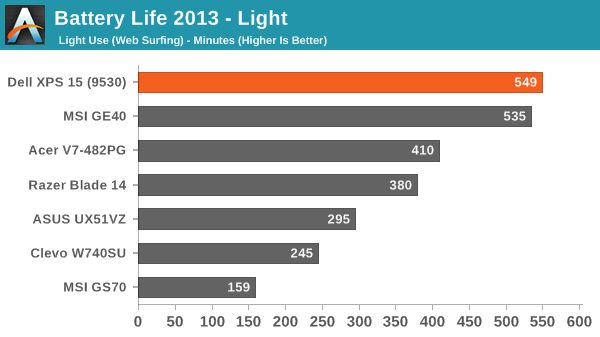
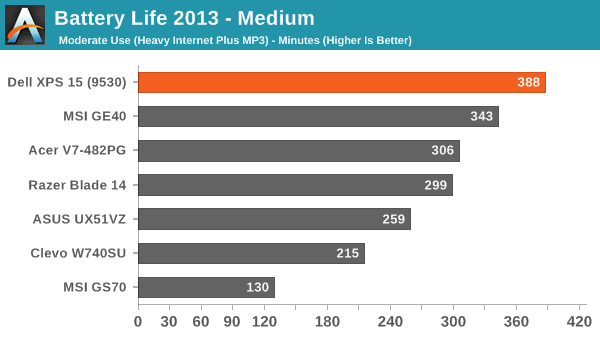
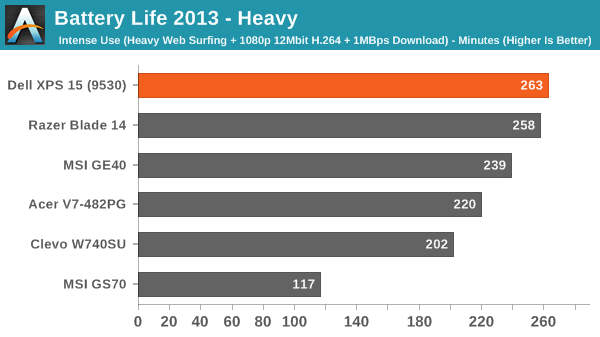
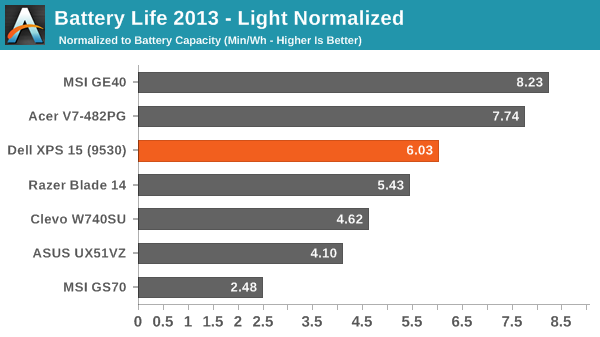
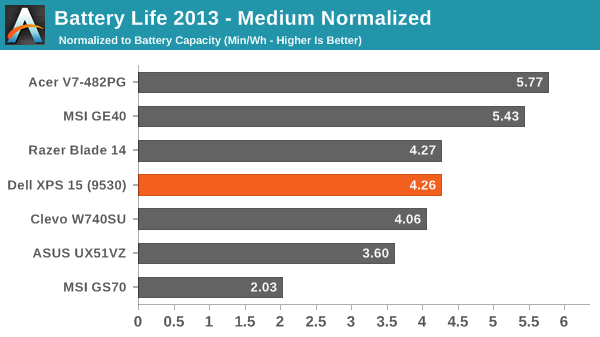
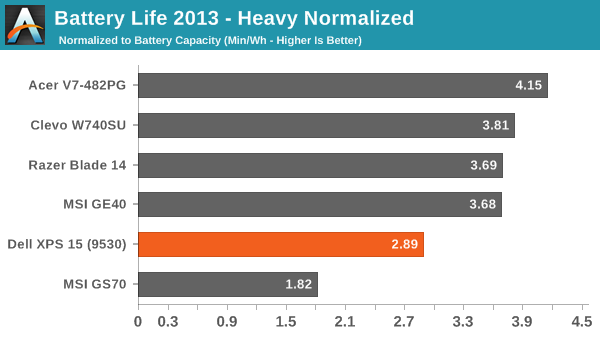
Thanks in a large part to the 91Wh battery, the XPS 15 is able to place quite far up our battery life charts in terms of raw unplugged time. It’s not quite so awesome when we look at the normalized Min/Wh figures, but while that can be useful information at the end of the day people are going to be using the battery they get with this laptop. We measured nine hours of battery life in our light workload, nearly 6.5 hours in our moderate workload, and around 4.5 hours in our heavy workload.
Interestingly, our new Heavy test using the Video app with a lower bitrate 1080p MP4 results in battery life that’s basically the same as our previous Medium testing – so with Video, playing a fullscreen MP4 while streaming 1MBps and loading Internet pages every ten seconds isn’t really any more taxing than playing back an MP3 while surfing the web. It appears Microsoft's Video app can scale content without incurring a power penalty, whereas when I was using Media Player Classic previously higher resolution displays often did worse (e.g. look at the XPS 15 results above).
Trying to game off the mains is a different matter, however, and even with a relatively large battery the XPS 15 only manages less than two hours while running Skyrim. (If you’re wondering, for testing gaming battery life, we use the Balanced power profile with the GPU set to “Prefer Maximum Performance”. Then we load up our Skyrim save in the town of Whiterun and let the system run until the battery is drained. The camera begins to pan around the character so it’s at least moderately demanding, though other games are certainly more so.)










152 Comments
View All Comments
callmesissi - Friday, March 7, 2014 - link
Great review. I'd like to ask you WHY do you keep comparing Windows products to MAC products. In real life you cannot do in a mac what a windows machine can, and dont get me started on "simulation software", if you do run windows on top of mac add the cost of windows license + simulation software and then benchmark the mac and lets see how fast it is by running that.Dont get me wrong, this is NOT a "i hate mac" post. But for a living i repair and give technical support to windows machines, and you CANT do everything that you can do in a windows pc on a mac. from hardware to software. for example my main client has quite a few stores + the central base and the radio software (win only) the printers (win only) the accounting software (win only) and so on...
I do hope you review Mac as a Mac versus other mac and not versus a windows pc. Macs are pretty much good for any user that does not use it for work, or business that use some specialized software like pilots, navigation, design and that's pretty much it.
I know it wont be long where we wont have that windows / macOS / android / ios / etc. problems, future is aiming for an open source, html based software that can run on any platform. but this is today and as of today you simply CANT use a Mac to replace a pc.
And not to mention a pc gamer... how many games are on a Mac?...
Please, just compare apples to apples (pun intended) or if you do, then add parallax + windows to the mac and then set benchmarks. Windows has support for like a 1,000,000 things more than a mac does.
my two cents.
Ma Deuce - Friday, March 7, 2014 - link
It's extremely easy to run windows on a mac... Saying that you can't replace a pc with a mac is just completely false.My line of work requires me to use several Windows only programs, and none of them have issues running on my macbook pro.
About the only thing you can't do is make a good living providing repairs and technical support to mac owners, they just don't have as many issues lol
Penti - Saturday, March 8, 2014 - link
Plenty of enterprises run Windows on Apple machines, support-people shouldn't be unaware of that, guess he's never heard of bootcamp or for that matter knows what parallels is. A mac is a qualified machine for volume licensing. Corporations can just stream their business apps from their TS/RDS/Citrix environment rather then let users who use OS X virtualize Windows. The only thing you really can't do is remote control everything like on vPro/iAMT-machines but the same goes for this Dell. For a end user, a Windows license is about 100 dollars. For business it's pretty much the same as including any other machine in your volume licensing program. If you need Parallels it's 70-80 dollars. A small business can run Windows only accounting software just fine, the virtualization software will make it launch from the dock just like any other program if you like to do that, some OS X users can use business and accounting software that run natively. It's really not an issue any more. It mixes really well with a Microsoft server environment, regardless which OS you choose to run albeit some extra software is required to administrate the OS X-machines with ease.For a end user who wishes to legally use Windows on their mac it's just the 100-200 dollars extra. Even with that extra cost a MBAir and so on usually does very well against semi-expensive Windows-powered Ultrabooks. If they do choices that makes it worse then it need to be at the price point it's worth taking note. Even if most mac users prefer to use OS X for 90% of work. There is also some software for OS X in a few professional fields that aren't available for Windows and has no alternative. You really can't treat them like say if they wore a ARM-based tablet, hardware-wise it's totally comparable and sites like this one do benchmark on Windows too. Prices and price ranges are easy to compare too.
robco - Thursday, March 13, 2014 - link
Comparisons of high-end Windows laptops with MacBooks is inevitable. Apple's industrial design is considered to be the best in the business. The price difference between the model reviewed here and the comparable rMBP config is $170. The Mac has Thunderbolt (which gives you GigE with an adapter), plus Apple has their own OS. Dell's support is less expensive though.As for not being able to use it for work, I know many people who would disagree. Most web devs I know (who don't use .NET) use Macs. Same with most mobile app devs (required for iOS, much easier to set up Android SDK on OS X vs. Windows). Not to mention quite a number of A/V pros. As for most general business tasks, a Mac can do those just fine - just not necessarily with the exact same software. Most F/OSS is *nix based and OS X is UNIX. Unlike other *nix systems, OS X has a fair amount of commercial software as well.
If you are buying a system primarily for gaming, then of course you want a Windows box. But even that is changing. Check out Steam or even the Mac App Store and you will see quite a few titles available. For everything else, there's BootCamp.
Ultimately a computer is a tool. Use the best tool for your needs. But understand that the needs of others may be quite different from yours. For me and my needs, a Mac works better. However I understand that for many, the opposite is true. But quite a number of people (including the primary author of this site), find Macs to be quite useful for getting "real" work done...
blzd - Friday, March 7, 2014 - link
Never buying another one of these after the 15z battery would die after 1 year almost exactly.tviceman - Friday, March 7, 2014 - link
Maxwell is jumping and screaming to get put inside this chassis!augiem - Saturday, March 8, 2014 - link
It would have been nice to see mbpr in some of the tests and benchmarks where applicable. After all, that's what this thing is trying to be. At the very least on the screen tests and battery life charts.JPDiueholm - Saturday, March 8, 2014 - link
Did you encounter any problems like:http://en.community.dell.com/support-forums/laptop...
Which has rendered the XPS 13 unusable!
petar_b - Saturday, March 8, 2014 - link
It would be nice to compare the above mentioned DELL notebook with ASUS NV550 touch screen. They have almost identical hardware, both come with SSD, however AUSU kept optical drive (blu ray burner), and still has two fans (one for each PU). for the height of 8mm-18mm DELL sacrifices optical drive, while ASUS kept height of 27mm (and has lots of empty space below, I am sure asus could save 3-4 mm if the case was closer to components. Price of asus is aprox 1200eu while dell is 2000 eu. Not sure if dell is overpriced...Flying Goat - Saturday, March 8, 2014 - link
Hmm...I can't find anything about an "NV550". Looks to me like the Asus N550 (No V) weighs 6 pounds, not 4.5, has a mechanical HDD, and a standard resolution screen, also does not have 802.11ac (Though it does have an ethernet port), so not at all comparable, except perhaps in terms of video card and CPU. If you don't care about the weight or the high res screen, then you shouldn't buy the Dell, but if that's what you want, the price seems competitive with comparable models.The ASUS model you should be comparing it to is the ASUS Zenbook UX51Vz-XH71, which costs $2400 (More than the Dell). It's also light, and has high res monitor. However, it has previous generation CPU/GPU (Ivy Bridge, 650GTX), no touch screen, only 8 GB RAM, no 802.11ac, and marginally lower resolution monitor. Only things it has going for it are an ethernet port and bing only 4 pounds instead of 4.44. Anyhow, given that price, I'd call the Dell's pretty competitive, if you want a light gaming laptop with a high res screen - there aren't a lot of models that fit that bill.
If you want a gaming laptop, but don't care about the weight, and are happy with a lower resolution screen, the price premium may not be worth it.